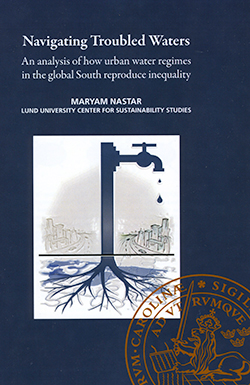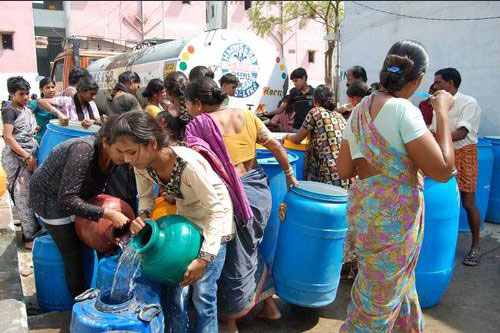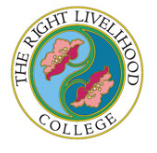Postal address: LUCSUS, Box 170, SE-221 00 Lund, Sweden
Visiting address: Josephsonhuset, Biskopsgatan 5
Web page: http://www.lucsus.lu.se/

 Contact person: Director, Professor Lennart Olsson, phone: +46 (0)46 222 05 11
Contact person: Director, Professor Lennart Olsson, phone: +46 (0)46 222 05 11
 Till 1 January 2005 LUCSUS was called the Centre for Environmental Studies, MICLU. The change of name coincides with the centre moving out from being part of the Faculty of Natural Sciences into becoming an independent centre at Lund University.
Till 1 January 2005 LUCSUS was called the Centre for Environmental Studies, MICLU. The change of name coincides with the centre moving out from being part of the Faculty of Natural Sciences into becoming an independent centre at Lund University.
The role of the centre, established in January 2000, is to be a centre for environment related activities at Lund University in basic education and post-graduate studies as well as research.
LUCSUS is a multidisciplinary centre that works with information and contact activities with respect to the environment and sustainable development, and works together with all faculties at the university. The objective is to promote cooperation across faculty boundaries and facilitate contacts between researchers and PhD-students from different departments. It also provides information on courses and programmes in environmental science from different subjects, and promotes environmental awareness in different disciplines and programmes. Another task is to further contacts between researchers and the society outside academia.
SASNET has held several joint seminars with LUCSUS.
Research connected to South Asia
 Professor Stefan Anderberg was LUCSUS Co-Director for six years till 2013, when he moved to Linköping University and became Professor in Industrial Ecology at the Division of Industrial Economics at the Dept. of Management and Engineering (IEI). Read more about his new position at Linköping.
Professor Stefan Anderberg was LUCSUS Co-Director for six years till 2013, when he moved to Linköping University and became Professor in Industrial Ecology at the Division of Industrial Economics at the Dept. of Management and Engineering (IEI). Read more about his new position at Linköping.
Stefan has a PhD in Social and Economic Geography, and his research interests are Land use development, Landscape planning, Regional and urban metabolism (material flow analysis), Industrial ecology, and International environmental cooperation. During the period 1996–1998, he was member of the Advisory Board for the Damodar Valley Project, Center for the study of Man and Environment, based in Kolkata, India. More information on the Damodar Valley Project.
Recently, Dr. Anderberg has been actively working to initiate a collaboration project with an Indian university, Mahatma Gandhi University in Kottayam, Kerala, where he has contacts.
In October 2010, he was awarded SEK 200 000 a one-year research grant from Sida/SAREC’s Developing Country Research Council, for a project entitled ”Electronic waste recycling in developing countries – How to make globalization more compatible with sustainable development?”. More information.

 Maryam Nastar has been a PhD candidate at LUCSUS, doing research on water governance models in urban areas. Maryam Nastar has written several publications on water governance in India, and has previously worked in an EU funded research project on sustainability assesment.
Maryam Nastar has been a PhD candidate at LUCSUS, doing research on water governance models in urban areas. Maryam Nastar has written several publications on water governance in India, and has previously worked in an EU funded research project on sustainability assesment.
Maryam defended her doctoral dissertation entitled ”Navigating Troubled Waters. An analysis of how urban water regimes in the global South reproduce inequality” on Friday 25 April 2014. Faculty opponent was Prof. Andrew Stirling from the Science and Technology Policy Research (SPRU) at University of Sussex, Brighton, UK. The thesis is based on fieldwork in Hyderabad, India, and Johannesburg, South Africa.
 Abstract: By employing a critical realist approach, different theories in relation to inequality are applied in exploring the mechanisms and conditions leading to the unequal provision of water. In doing so, a structuralist perspective is built on the transition framework, integrated with critical urban theory and tested in two settings, Johannesburg, South Africa, and Hyderabad, India. In addition, a relational perspective, based on the concept of durable inequality, is used to scrutinize the relationship between state and citizen in contemporary South Africa and India.
Abstract: By employing a critical realist approach, different theories in relation to inequality are applied in exploring the mechanisms and conditions leading to the unequal provision of water. In doing so, a structuralist perspective is built on the transition framework, integrated with critical urban theory and tested in two settings, Johannesburg, South Africa, and Hyderabad, India. In addition, a relational perspective, based on the concept of durable inequality, is used to scrutinize the relationship between state and citizen in contemporary South Africa and India.
 Combining these perspectives tells us that the emergence of urban water regimes and inequality in access to water are associated with a set of different mechanisms, such as world city formations, and the World Bank’s strategic governance move, in promoting corporate models for municipalities and water utilities. They are also attributed to specific geo-historical conditions, within and through which different forms of inequality have been constructed around bounded categories (e.g. race, caste, class) especially through the politics of privilege and the politics of resistance in these cities. In Johannesburg, the dominance of the ANC and its use of increasingly technocratic modes of government have hindered many forms of political participation. In Hyderabad, there is less meaningful interaction between the state and the citizens as compared with Johannesburg, in so far as the mode of intermediation is often through party-based patronage. More information, with link to full-text thesis.
Combining these perspectives tells us that the emergence of urban water regimes and inequality in access to water are associated with a set of different mechanisms, such as world city formations, and the World Bank’s strategic governance move, in promoting corporate models for municipalities and water utilities. They are also attributed to specific geo-historical conditions, within and through which different forms of inequality have been constructed around bounded categories (e.g. race, caste, class) especially through the politics of privilege and the politics of resistance in these cities. In Johannesburg, the dominance of the ANC and its use of increasingly technocratic modes of government have hindered many forms of political participation. In Hyderabad, there is less meaningful interaction between the state and the citizens as compared with Johannesburg, in so far as the mode of intermediation is often through party-based patronage. More information, with link to full-text thesis.
PhD candidate Gregory Pierce is doing research on Nepal. In 2013 he published a paper entitled ”The Embodiments of ice and Bone: Dualistic Ideologies, ‘Permanence Through Certainty’, and the Phenomenology of Being of Dolpo, Nepal”. For at least one thousand years, the Dolpo-pa, the people of Dolpo, an enclave of culturally Tibetan transhumant agro-pastoralists dwelling through the high Himalayas of Midwestern Nepal, have caravanned ware-laden yak over the high passes and through the barren valleys of their mountain homeland. Masters of the salt-for-grain circuit of trade between the Tibetan Plateau and the Gangian Plains, in moving through those unforgiving lands Dolpo-pa herders have through the centuries been confronted by a range of natural hazards—landslides, avalanches, flash floods, earthquakes, etc. Read more.
Educational programmes
LUCSUS is the host of the international masters programme LUMES (Lund University International Master’s Programme in Environmental Studies). Every year, the masters programme attracts students from many countries all over the World, including South Asia. More information on LUMES.
The Right Livelihood College (RLC) invites students to apply for the PhD course “Critical Urban Theory: Citizenship, Marginalities, Livelihood Struggles and Innovations in Practice”, that is jointly organized by Lund University Centre for Sustainability Studies (LUCSUS) and Tata Institute of Social Sciences (hosted by Centre for Livelihoods and Social Innovation, CLSI). The course is designed for MPhil/PhD students working on urban and livelihoods issues from different critical perspectives. The focus will be on linking critical urban theory with innovative practices, for example grass-roots initiatives and slum improvement projects in the city of Mumbai, India, developed and led by Medha Patkar, a Laureate of the Right Livelihood Award, to address current complex socio economic and environmental issues in the urban space. The course content will be covered in two modules, Module I in Mumbai (4-8 January 2016) and Module II in Lund (4-8 April 2016), at Campuses of the Right Livelihood College (RLC) at LUCSUS, Lund University and CLSI, TISS. You can register to the course by sending an email to maryam.nastar@lucsus.lu.se no later than 30 September 2015. More information.
LUCID – Lund University Centre of Excellence for Integration of Social and Natural Dimensions of Sustainability
 LUCID is a new research programme in Sustainability Science funded by a Linnaeus grant, sponsored by The Swedish Research Council for the period 2008–2018. Linnaeus Grants are awarded to exceptionally strong environments performing research of the highest international quality and aiming at innovative research.
LUCID is a new research programme in Sustainability Science funded by a Linnaeus grant, sponsored by The Swedish Research Council for the period 2008–2018. Linnaeus Grants are awarded to exceptionally strong environments performing research of the highest international quality and aiming at innovative research.
The Centre is administered through LUCSUS, but gathers together seven disciplines from four faculties for together developing the scientific field “Sustainability Science”. LUCID aims at creating completely new and unique synergies across natural and social sciences in order to develop new integrated theories and methods for addressing complex sustainability issues. The research will offer theoretical, methodological and practical contributions to the broad and emerging field of sustainability science. More information about LUCID.
Right Livelihood College PhD course in Mumbai and Lund

 During the spring semester 2016, the Right Livelihood College (RLC) – a global capacity building initiative of the Stockholm based Right Livelihood Award Foundation – arranges a PhD course entitled “Critical Urban Theory: Citizenship, Marginalities, Livelihood Struggles and Innovations in Practice” to be held in Lund, Sweden and Mumbai, India. The PhD course is organized by LUCSUS in collaboration with the Tata Institute of Social Sciences (TISS) and its Centre for Livelihoods and Social Innovation (CLSI). The course is designed for MPhil/PhD students working on urban and livelihoods issues from different critical perspectives. Almost 30 participants have been registered, coming from all over the world, including Brazil, Hong Kong and Spain.
During the spring semester 2016, the Right Livelihood College (RLC) – a global capacity building initiative of the Stockholm based Right Livelihood Award Foundation – arranges a PhD course entitled “Critical Urban Theory: Citizenship, Marginalities, Livelihood Struggles and Innovations in Practice” to be held in Lund, Sweden and Mumbai, India. The PhD course is organized by LUCSUS in collaboration with the Tata Institute of Social Sciences (TISS) and its Centre for Livelihoods and Social Innovation (CLSI). The course is designed for MPhil/PhD students working on urban and livelihoods issues from different critical perspectives. Almost 30 participants have been registered, coming from all over the world, including Brazil, Hong Kong and Spain.
The focus will be on linking critical urban theory with innovative practices, e.g. grass-roots initiatives and slum improvement projects in the city of Mumbai, India, developed and led by Medha Patkar, a Laureate of the Right Livelihood Award, to address current complex socio economic and environmental issues in the urban space. The course content will be covered in two modules, Module I in Mumbai (4-8 January 2016) and Module II in Lund (4-8 April 2016). The course is coordinated by Dr. Maryam Nastar from LUCSUS, assisted by Dr. Swati Banerjee and Dr. Santha Sunil from TISS. Another three Lund University lecturers are enrolled as lecturers, namely Prof. Eric Clark, Prof. Turaj Faran, and Dr. Mine Islar. More information about the PhD course.
The Right Livelihood College, launched in 2009, aims to be five things – a hub, a catalyst, an incubator, a multiplier and an accelerator of links between universities and the work of Right Livelihood Laureates, an interactive link between academics and activists. Every Right Livelihood Laureate – the awards given each year slightly before the Nobel Prizes – is automatically a Fellow of the Right Livelihood College. The role of the Fellow is to be the principal source of supply of learning resources through engagement in activities of education, scientific research, and practical activities that share and upscale their work. Fellowships and research grants are also given to outstanding students and researchers to further work on issues Laureates are working on; some ten fellowships have been awarded.
The College also works closely with the Laureates in identifying appropriate institutions that can be partners with the College and the Laureates. It is planned to develop such partnerships worldwide with at least one major link in each continent. Lund University and TISS in Mumbai are two of them, along with select universities in Malaysia, Ethiopia, Nigeria, Chile, USA, and Germany. More information about the Right Livelihood College.